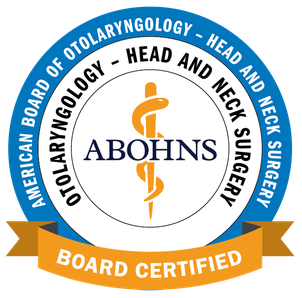
Nasal Polyps
Nasal polyps are benign growths that develop within the lining of the nasal passages or sinuses. If large enough, these growths may block the passages and cause breathing difficulties, sinus infections or other complications. Nasal polyps can affect anyone, but they occur more frequently in adults. Medications may shrink or eliminate nasal polyps, but surgery is sometimes needed to remove them.
Symptoms of Nasal Polyps
Most patients with nasal polyps may experience the following symptoms:
- Nasal congestion
- Runny nose
- Headache
- Facial pain
- Loss of smell or taste
- Sinus pressure
- Snoring
If the nasal polyp is small, patients may not experience any symptoms and may be unaware that they even have a nasal polyp.
Causes of Nasal Polyps
Nasal polyps are most common in adults, especially those that have asthma or allergies. The exact cause of nasal polyps is not known, however, they often develop in occurrence with respiratory diseases such as sinusitis and allergic rhinitis or with immunodeficiency conditions. Children with cystic fibrosis are also at a higher risk of developing nasal polyps.

Diagnosis of Nasal Polyps
Nasal polyps are commonly diagnosed by a doctor or otolaryngologist who will review the patient's symptoms and perform a physical examination of the nose. A lighted instrument is commonly used to look inside the nose through a procedure called a nasal endoscopy. Additional diagnostic tests may include:
- Allergy tests
- CT Scan
- MRI
- Cystic Fibrosis test for children
Nasal Endoscopy
A nasal endoscopy is a diagnostic procedure that allows for quick evaluation of the nasal passages in a safe, minimally invasive manner. An endoscopy is a medical procedure that inserts an instrument called an endoscope, a thin, flexible tube, into the body to provide a detailed view and images that may be projected onto a computer screen.
Treatment of Nasal Polyps
Medication
Treatment for nasal polyps is often provided through medications that can reduce the size of the polyp or even eliminate it. Medication such as corticosteroids may be administered in the form of pills or nasal sprays. If allergies are the cause of the nasal polyps, allergy medications may be given or antibiotics may be prescribed to treat recurring nasal infections.
Surgery
Surgery may be required to remove the polyp if medication is unsuccessful. Surgery for nasal polyps may include:
Polypectomy
A polypectomy is a simple surgical procedure to remove nasal polyps, or small growths which may appear in the nose or sinuses.
During a polypectomy, the surgeon removes the polyps through the nose, relieving symptoms and reducing the chance of their recurrence. This procedure can be performed in the office at Coastal Ear, Nose and Throat with a mechanical device called a microdebrider which combines suction with the use of a small blade. After a polyp is removed, a biopsy is performed on the tissue to make sure there is no malignancy present.
After a polypectomy, patients can return to work and other regular activities right away. Normally a nasal irrigation is performed to cleanse the area and a nasal steroid spray may be prescribed to help prevent a regrowth of polyps.
Endoscopic Sinus Surgery
Endoscopic sinus surgery, also known as sinoscopy, is a minimally invasive surgical procedure used to remove blockages in the sinuses for recurring sinus infections.
During the procedure, a thin lighted tube with a camera on the end is inserted into the nose to let the doctor visually examine the area. Tiny surgical instruments are then inserted to remove the obstructive tissues. Endoscopic sinus surgery does not require any incision, as the whole procedure is performed through the nostrils. Most procedures are performed on an outpatient basis and patients can go home the same day.
Most patients experience a major relief in symptoms such as facial pain and swelling, difficulty breathing and headaches. Aside from sinus surgery, endoscopic sinus surgery can also treat a deviated septum, polyps or tumors.

Prevention of Nasal Polyps
Not all nasal polyps can be prevented, however, the following recommendations may help in minimizing the occurrence of nasal polyps:
- Use a humidifier
- Treat allergies and colds
- Use a saline or saltwater nasal rinse with nasal steroids
- Avoid irritants such as smoke, chemicals and dust
Nose & Sinus
 Septoplasty
Septoplasty Balloon Sinus Surgery (Sinuplasty)
Balloon Sinus Surgery (Sinuplasty) Adenoid Hypertrophy
Adenoid Hypertrophy Allergic and Chronic Rhinitis
Allergic and Chronic Rhinitis Pituitary Tumors
Pituitary Tumors Anosmia (Lack of Smell)
Anosmia (Lack of Smell) Cerebral Spinal Fluid Leaks
Cerebral Spinal Fluid Leaks Nasal Fracture
Nasal Fracture Nasal Obstruction
Nasal Obstruction Nasal Polyps
Nasal Polyps Nosebleeds (epistaxis)
Nosebleeds (epistaxis) Post Nasal Drip
Post Nasal Drip Sinusitis
Sinusitis Minimally Invasive Office Procedures
Minimally Invasive Office Procedures Tearing And Eye Surgery
Tearing And Eye Surgery













